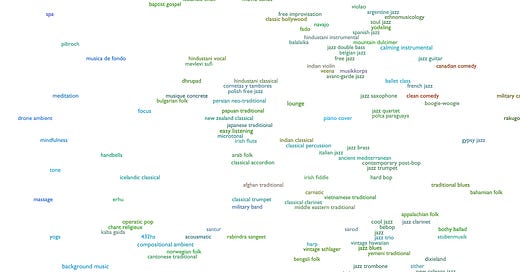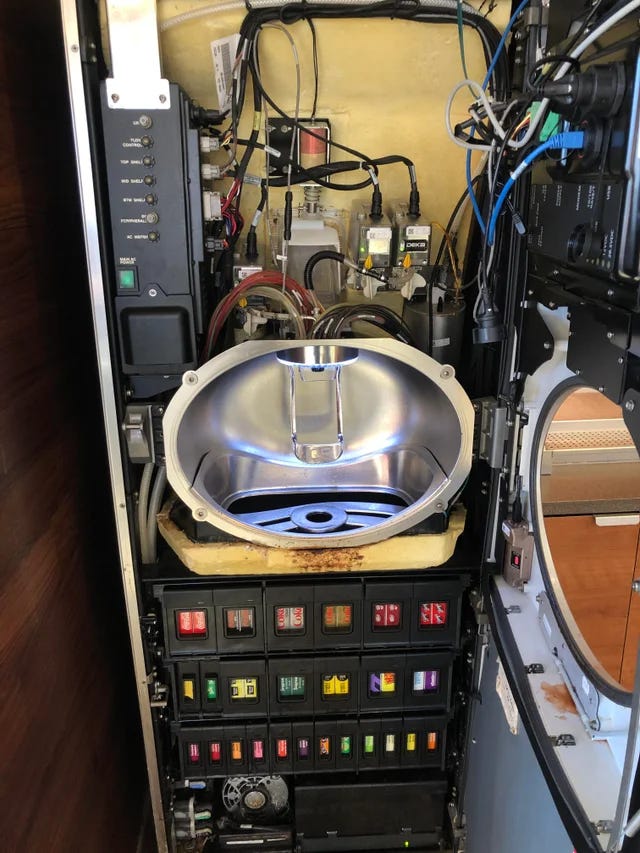Why is this interesting? - The Genre-Bending Edition
On music, taxonomies, and the shift to a more ontological approach to categorization
Noah here. One of my favorite albums from the last few years was King Krule's 6 Feet Beneath the Moon. It's moody and weird, but undeniably interesting. It came out in 2013 when Archy Marshall—King Krule's real name—was only nineteen. That year belonged to another teenager, though, with the release of sixteen-year-old Lorde's album Pure Heroine.
I’m no music critic, but Sasha Frere-Jones is, and on a 2013 New Yorker podcast episode, he made a fascinating observation about the two artists and their genre-flouting abilities. Specifically, he outlined the role of unlimited access in their musical education. Answering a question about how both seemed to emerge fully-formed, Frere-Jones explained:
I’m going to say the internet has got to be a factor here because it allows you to get up to speed so quickly and both Ella (Lorde) and Archy (King Krule) were making references to lots of music that I did not think that they would know about but obviously they have instant access. Although Archy was actually citing his dad’s record collection … you heard that twenty years ago when hip hop started, people talked a lot about sampling their dad’s jazz collection. I think the internet has something to do with their savvy but it doesn’t entirely explain why they all sort of arrived at once.
Why is this interesting?
On the face of it, I want to believe in the idea that genre boundaries are dissipating. It feels right and certainly matches the widely-held experience of moving from a world organized around albums to one organized around algorithmically-generated playlists. On top of that, there’s no question that unlimited access is one of—if not the—critical techno-cultural shift of the 21st century. In all spheres—from finance to academia to journalism to marketing—access to a nearly unlimited supply of information is fundamentally shifting the possibilities for those with an appetite to seek it out.
But the thing about genre is that it was never really about the input, it was always about the output. By that, I mean: I feel reasonably confident that the best artists have always been omnivorous, finding inspiration in places that others didn’t think to look. But when it was time to produce something new, it had to be categorized in order to be marketed. While you could argue this effect was more pronounced in a time where records and CDs sat in rows on store shelves, it’s not like Spotify doesn’t maintain some genre metadata with each song.
In fact, rather than moving away from genres, Spotify has gone deep. The company organizes its songs across nearly 4,000 (and growing) “genre-shaped distinctions.” The image below comes from the site Every Noise at Once, which is maintained by Spotify “data alchemist” Glenn McDonald. As the page explains, “down is more organic, up is more mechanical and electric; left is denser and more atmospheric, right is spikier and bouncier.” And, crucially, artists can exist across multiple genres.
The truth is that music always worked this way: More of an ontology of sounds than a taxonomy of genres. Whereas a taxonomy is strict about its hierarchy—think of a list with bullets and sub-bullets—an ontology allows for any node to be connected to any number of additional nodes, creating a graph of relationships. Before music was entirely digitized (both the songs and the playback data), we didn’t have a particularly good way to map things. Once we start to see things this way, we realize that genre is a lot squishier than we may have originally believed. Take this explanation of the origins of different genres from McDonald:
In the same spirit, any artist can be in as many different genres as apply. The genres arenʼt even of the same sort: “tekno” is a very particular dance music style, defined by tempo and historical circumstance; “wind ensemble” is a configuration of performers; “Christian hip-hop” is philosophical distinction; “Slovenian rock” a cultural and geographic one.
And, of course, this shift from taxonomies to ontologies isn’t unique to music. Nike is hiring a taxonomy/ontology lead, likely to help with product discovery in ecommerce, and the BBC built an ontology of sport for the 2012 Olympics, to name two examples. But clearly, the implications are bigger than that: As we acquire both the data and the means to process it, most things that are currently organized taxonomically will likely give way to more complex and accurate networked descriptions. (NRB)
Photo of the Day:
The inside of a Coke freestyle machine. Related: Why Dean Kamen Invented the Coca-Cola Freestyle (via The Prepared)
Quick Links:
I couldn’t quite fit it in, but this Switched on Pop episode about Lizzo and genre is excellent. In there they quote her as saying, “I am the genre. My voice is the genre. I refuse to let y'all put me in any genre at this point because all you're trying to do is place me somewhere because I'm black or place me somewhere because I'm a woman, or because I make bops place me somewhere to make you feel comfortable.” (NRB)
Speaking of podcasts, this Longform episode with Errol Morris was excellent. (NRB)
This resonated with me: Congratulations, Parents: Winter Break Is Over (NRB)
Thanks for reading,
Noah (NRB) & Colin (CJN)
Why is this interesting? is a daily email from Noah Brier & Colin Nagy (and friends!) about interesting things. If you’ve enjoyed this edition, please consider forwarding it to a friend. If you’re reading it for the first time, consider subscribing (it’s free!).




